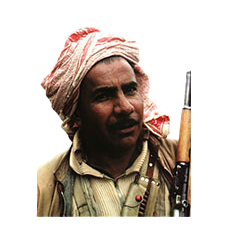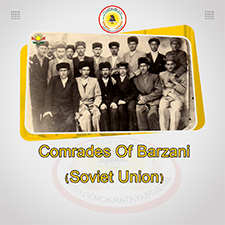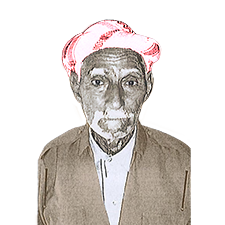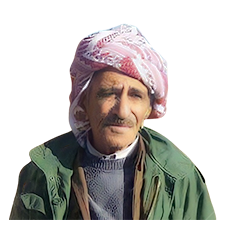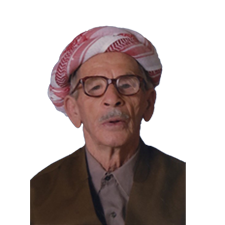Biography
Bejan Jendo Ali born in 1926 in the village of “Hudar” in eastern Kurdistan. He studied in the Soviet Union and there he married a Ukrainian woman named Roza Alexander. Bejan had two daughters named Erka and Asia. Also, Bejan got his degree in politics in the University of “Tashqand”. Additionally, he was a Russian professor in the University of Baghdad. His wife was an employee as well. However, in 1963 after the Baas Regime harassed Roza because Bejan was a Peshmerga and a comrade of Mustafa Barzani, she was forced to return to the Soviet Union. Later on, Bejan married his second wife Saadya Hussein Kareem in 1970. He then returns to Iran and resides in “Naghada” in 1974. Moreover, He was able to get Iranian citizenship for himself and his family. He worked as a farmer till the day he was killed.
On June 3rd, 1947, in the village of “Smail Agha” he joined with Barzani and participated in the battles of “Reraw”. After a lot of hardships, on the 18th of June in 1947, he was able to travel to the Soviet Union after passing through the Aras River which was between the borders of Iran and the Soviet Union.
After their arrival at the Soviet Union on the 19th of June in 1947 in the city of “Akhchawan” in the Republic of Azerbaijan, all of the comrades were placed in a community that was surrounded by barbed wire. They were being monitored by the soldiers and were treated like hostages of war when it came to food and clothes. Afterwards, the Soviet government decided that the comrades should be divided into the places of “Aghdam”, “Lachin”, “Ayulax” and “Kalbajar” in the Republic of Azerbaijan. On the 10th of December in 1947, they were transported to a military camp on the lake of “Khazar” in the capital of the Republic of Mahabad “Bakor”. On the 23rd of the same month, they were given military clothes and were trained by the officers of the republic 8 hours a day. On top of that, some of the comrades that were literate in Kurdish would teach the language for 4 hours a day.
After the ill-treatment of “Jaafar Baqrov” with the comrades, on the 29th of August in 1949, Barzani decides to transport his military camp from the republic of Mahabad to a “Chrchuk” community near the city of “Ashkand” which was the capital of Uzbekistan; there they continued their military practices.
In March of 1949, the comrades were divided into the villages of the Soviet Union and farms (where civilians would rent them from the governments and pay them back later). The comrades were working in these places.
Following multiple letters to Stalin by General Barzani, a letter finally reaches Stalin where it talks about the hardships the comrades are going through. Stalin immediately creates a party to investigate the comrades of Barzani; the party comes to the decision that everyone should gather in the city of “Vrivsky”. Everyone travels to the city in November of 1951.
After the July 14, 1958, revolution in Iraq and the return of General Mustafa Barzani, on February 25, 1959, according to both Articles 3 and 7, paragraph (a) of Article 10 and according to Article (11), and based on the amended law No. 19, General Mustafa Barzani and his comrades were granted a general amnesty.
Because of the creation of the Republic of Iraq in 1958 by Abdul Kareem Qasim, Bejan along with his comrades travels back to Kurdistan with the ship “Grozya” through the harbor of “Basra” on the 16th of April in 1959.
Bejan participated in the revolution of “Aylul” in 1962. Moreover, he became the battalion commander of Battalion 6 after Saed Asi Saed Asi Muhammed. Also, Bejan participated in the battles of “Zargalli”, “Gorazi”, “Dashti Hawler”, “Koye”, “Ranya”, “Qaladze”, and “Badinan”.
In 1979, Doctor Qasmlo sends Bejan a letter because he needed Bejan to contact the Democratic Party of Kurdistan in Iran. Bejan returns home to see his family after he visits the party. Unfortunately, the Iranian government finds out and a battle breaks out between the Islamic Republic of Iran and the Democratic Party of Kurdistan; Bejan dies in the battle, and he gets buried in his village “Hudar”.
Sources:
ئەرشیفی دەستەی ئینسکلۆپیدیای پارتی دیموکراتی کوردستان




